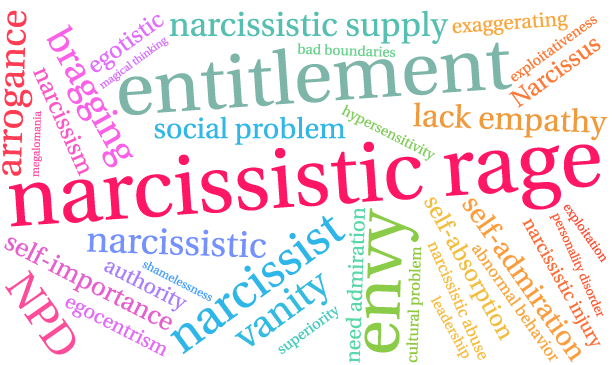
Abusive Relationships
Abuse by anyone is traumatic – and abuse from a malignant narcissism can be crippling. Learning about NPD and recovery from narcissistic is an important step in healing.
Cyberstalking and Harassment
Cyberstalking and cyber harassment can happen to anyone – but when you leave a narcissistic abuser, you need to know how to fight back against cyberstalking and cyber harassment
Resources for Victims
When you are suffering at the hands of a narcissistic or cyber abuser, you need to build a community of support. Counseling, legal aid, law enforcement and cyber support can help you when you're down.

Narcissistic Personality Disorder and Narcissistic Abuse Recovery
Emotional and psychological abuse by a narcissist is traumatic – and abuse from a malignant narcissism can be crippling. Learning about NPD and recovery from narcissistic is an important step in healing.
About Narcissistic Personality Disorder
Narcissistic Personality Disorder (NPD) is a personality disorder classified within cluster B (along with Anti-Social Personality Disorder, Borderline Personality Disorder and Hystrionic Personality Disorder).
The DSM-5 indicates that persons with NPD usually display some or all of the following symptoms, typically without the commensurate qualities or accomplishments:
- Grandiosity with expectations of superior treatment from other people
- Fixated on fantasies of power, success, intelligence, attractiveness, etc.
- Self-perception of being unique, superior, and associated with high-status people and institutions
- Needing continual admiration from others
- Sense of entitlement to special treatment and to obedience from others
- Exploitative of others to achieve personal gain
- Unwilling to empathize with the feelings, wishes, and needs of other people
- Intensely envious of others, and the belief that others are equally envious of them
- Pompous and arrogant demeanor
The DSM-5 indicates that the traits manifested by the person must substantially differ from cultural norms, in order to qualify as symptoms of NPD.
Due to the nature of the disorder, people suffering from Narcissistic Personality Disorder seldom seek help for their disorder, although they may seek limited help for symptoms like depression. While only about 2% of the population is officially diagnosed, a 2004-2005 US government mental health survey of the general US population shows a prevalence of life-time NPD in 7.7 percent of men and 4.8 percent of women.
There are several subtypes of Narcissistic Personality Disorder and can have co-occuring disorders like other Cluster B disorder (especially Anti-Social and Borderline Personality Disorders) and substance abuse problems.
Narcissists use emotional and psychological abuse to obtain power and control over their source of narcissistic supply.
Narcissistic Abuse
Because narcissists need an endless supply of admiration from others, they use emotional and psychological abuse to manipulate and control their target (typically a strong, compassionate partner).
They start by forming strong, but superficial bonds with the target then begin subtly pushing boundaries, escalating their manipulation over time.
How they manipulate
Narcissist have a large arsenal of weapons they use to gain power and control over victims. Here are a few...
Grooming / Love-bombing – Narcissists groom their targets by making them think the relationship is special. They move fast to sweep you off your feet, pushing intimacy early to form a bond. They listen intently to you and mirror your likes and dislikes to appear to be your perfect partner.
Idealize & Devalue – Narcissist slowly break down your self-esteem through Jeckyll & Hyde behavior. They will love and praise you one minute and criticize and devalue you the next. Their constant insults will often appear as backwards compliments or will be followed by "just kidding."
Projection – In their eyes, a narcissist can do no wrong. They blame their actions on you and will accuse you of exhibiting the behavior they themselves exhibit.
Gaslighting – The more confused you are, the easier you are to control. Narcissist purposely make their victims think they are crazy through gas lighting – a devious technique they use to doubt your own perception and memory.
Isolation – Narcissists spend a lot of time manipulating their victims and don't like to share. They work hard to isolate victims from friends, family and other resources that would be an obstacle to their total control.
Threats, Silence and Smears – Narcissists will keep victims off balance alternating between silent treatment (accompanied by frowns another negative body language) and loud, very malicious threats. At the discard stage of the narcissistic cycle, abusers will smear their victims to friends, family, coworkers, in court and online.
Click here to learn more red-flags of narcissistic abuse.
Effects of Abuse
Healing from long-term narcissistic abuse takes time. Victims often need to be treated for C-PTSD (or complex trauma disorder) and Narcissistic Abuse Syndrome for at least a year or two after the relationship is over.
Are you in crisis now?
Get help now. If you are in immediate danger, call 911 immediately.
You can also call the National Domestic Violence Hotline at 1-800-799-SAFE (7233). You'll be able to speak to an advocate 24/7.


